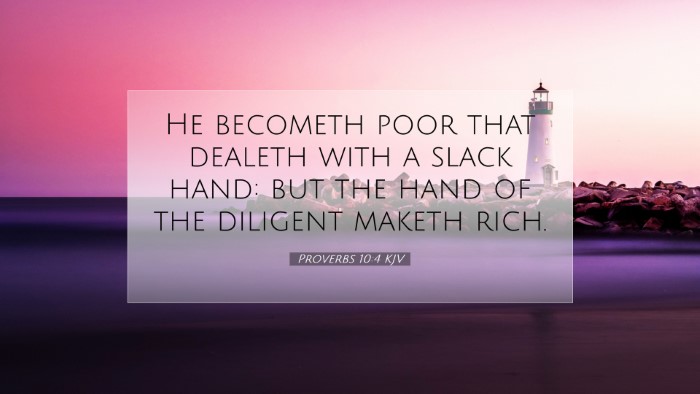Proverbs 10:4 Commentary
Verse: "He becomes poor that deals with a slack hand: but the hand of the diligent makes rich." (Proverbs 10:4, KJV)
Introduction
This verse encapsulates the timeless principle of diligence versus slothfulness. It reflects the broader biblical themes of work and stewardship, emphasizing that hard work is rewarded while laziness leads to poverty. Insights from established commentators provide a deeper understanding of this text.
Commentary Insights
1. Matthew Henry's Perspective
General Insights: Matthew Henry, in his exposition, notes that the contrast between "slack hand" and "the hand of the diligent" symbolizes the broader human experiences of effort leading to prosperity versus negligence resulting in hardship.
- Poverty from Laziness: Henry elucidates that a "slack hand" implies laziness or a lack of effort, which ultimately leads to poverty. He highlights that wealth is not merely a matter of circumstance but a reflection of one's industriousness.
- Diligence Leading to Wealth: Henry stresses that diligence in one’s work is the path to wealth. He underscores the importance of being industrious in our daily tasks and the satisfaction that follows such labor.
2. Albert Barnes' Analysis
Overview: Albert Barnes expands on the practical applications of the verse. He states that the principles found in Proverbs are particularly designed to guide moral and ethical behavior.
- The Necessity of Hard Work: Barnes reflects on the necessity of hard work for achieving one’s needs and ambitions. He points out that a lazy person will not only find themselves lacking material wealth but will also miss out on greater opportunities.
- Understanding "Diligence": He explains that "diligence" is more than mere hard work; it involves being consistent and persistent in one’s efforts. Barnes urges readers to understand that true diligence encompasses a disciplined approach to life’s tasks.
3. Adam Clarke's Commentary
Insights on Industry and Poverty: Adam Clarke’s insights echo the sentiments of Henry and Barnes but add a layer of theological reflection.
- Theological Implication: Clarke emphasizes that the verse not only pertains to physical wealth but also to spiritual and emotional fulfillment. He articulates that diligence in one’s spiritual life results in deeper riches in terms of faith and understanding.
- Sloth as a Greater Enemy: He elaborates on how sloth is often a greater enemy than poverty itself, as it can lead to a vicious cycle where laziness breeds more laziness and ultimately despair.
Application for Pastors and Theologians
This verse serves as a valuable teaching tool for pastoral care and theological education. Here are some practical applications:
- Encouragement for Congregations: Pastors can encourage church members to pursue diligence in every aspect of their lives, illustrating that both physical work and spiritual growth require commitment and effort.
- Principles of Stewardship: The theological application encourages leaders to teach stewardship that extends beyond financial wealth, encompassing time, talents, and spiritual gifts as areas where diligence should manifest.
- Countering Laziness in Ministries: Within church leadership, it is crucial to recognize and address laziness or complacency among ministries, fostering a culture of diligence.
Conclusion
Proverbs 10:4 succinctly presents a powerful truth about the nature of work and reward. Drawing from the writings of notable commentators like Matthew Henry, Albert Barnes, and Adam Clarke, this commentary illuminates the necessity of diligence in both practical and spiritual realms. For pastors, students, and theologians, this verse serves as a reminder of the importance of perseverance and effort in all aspects of life.


